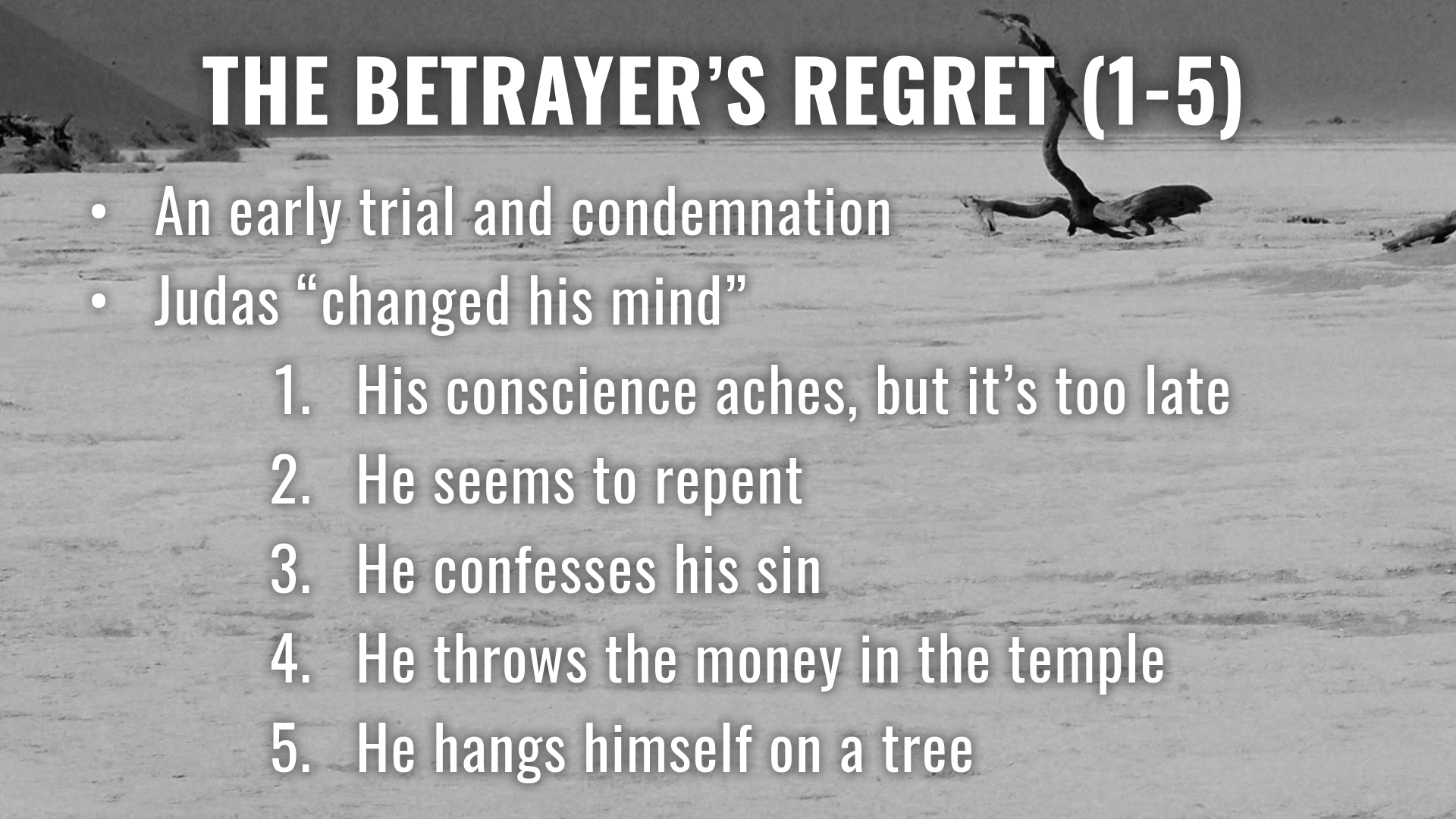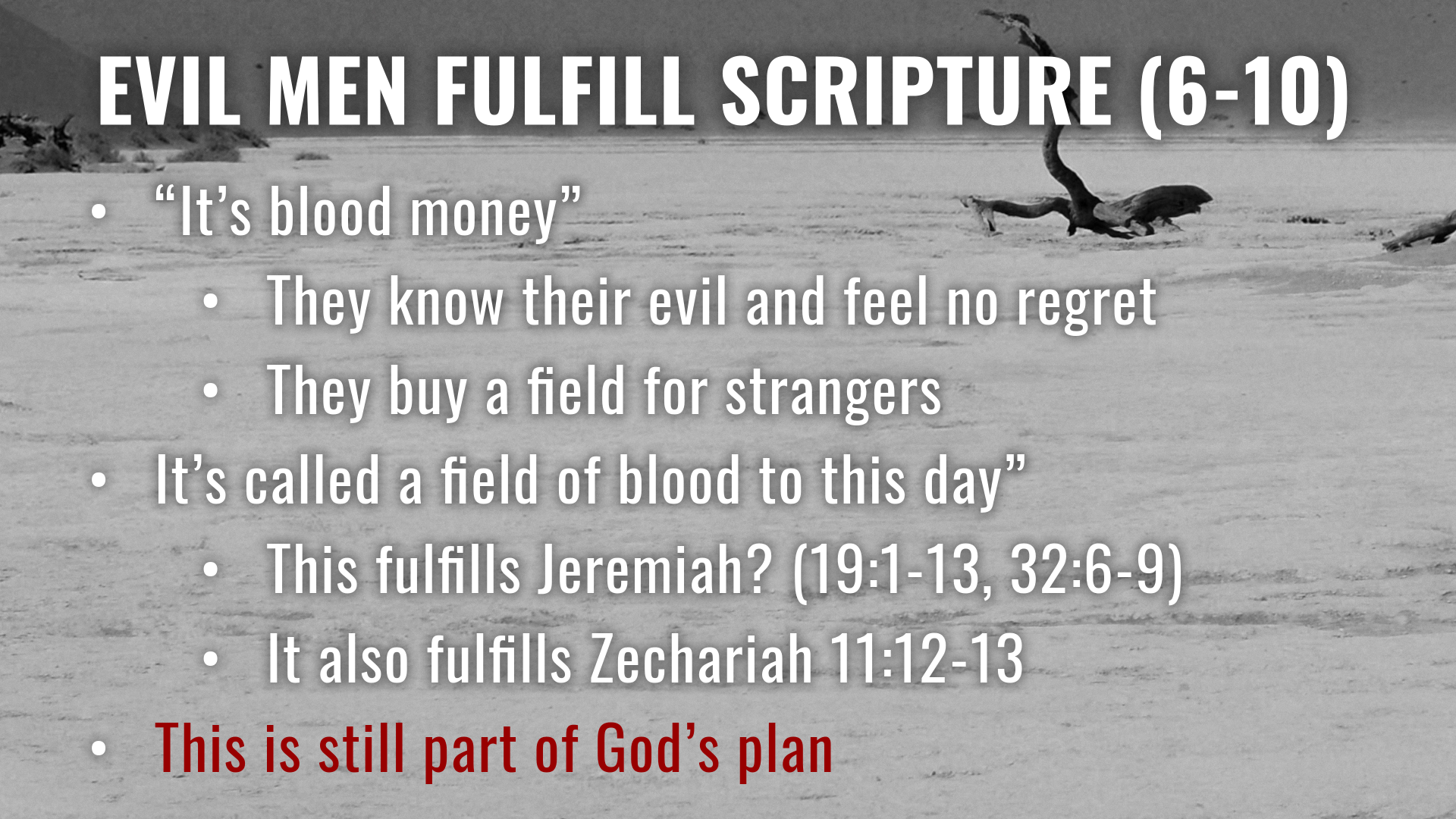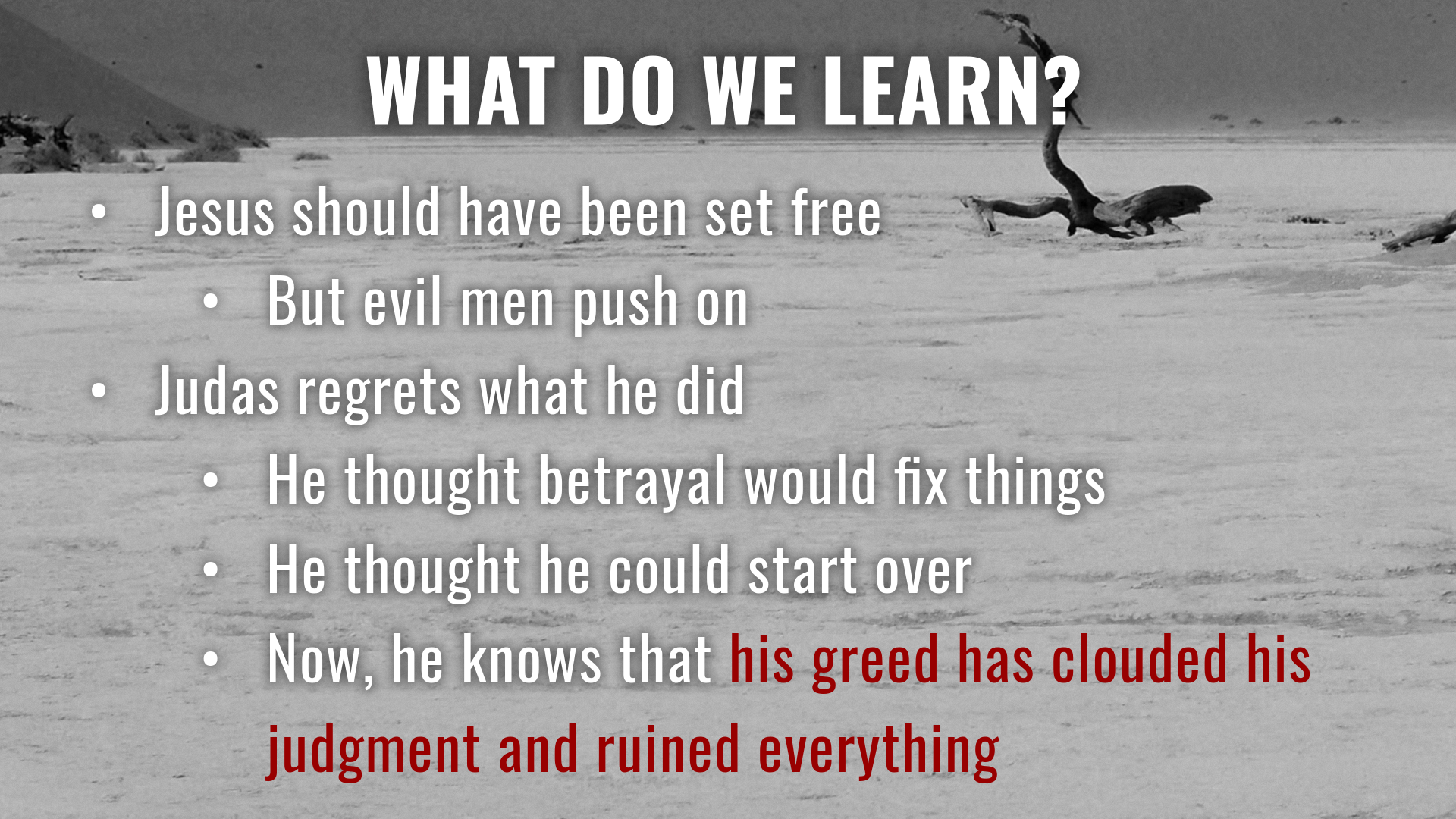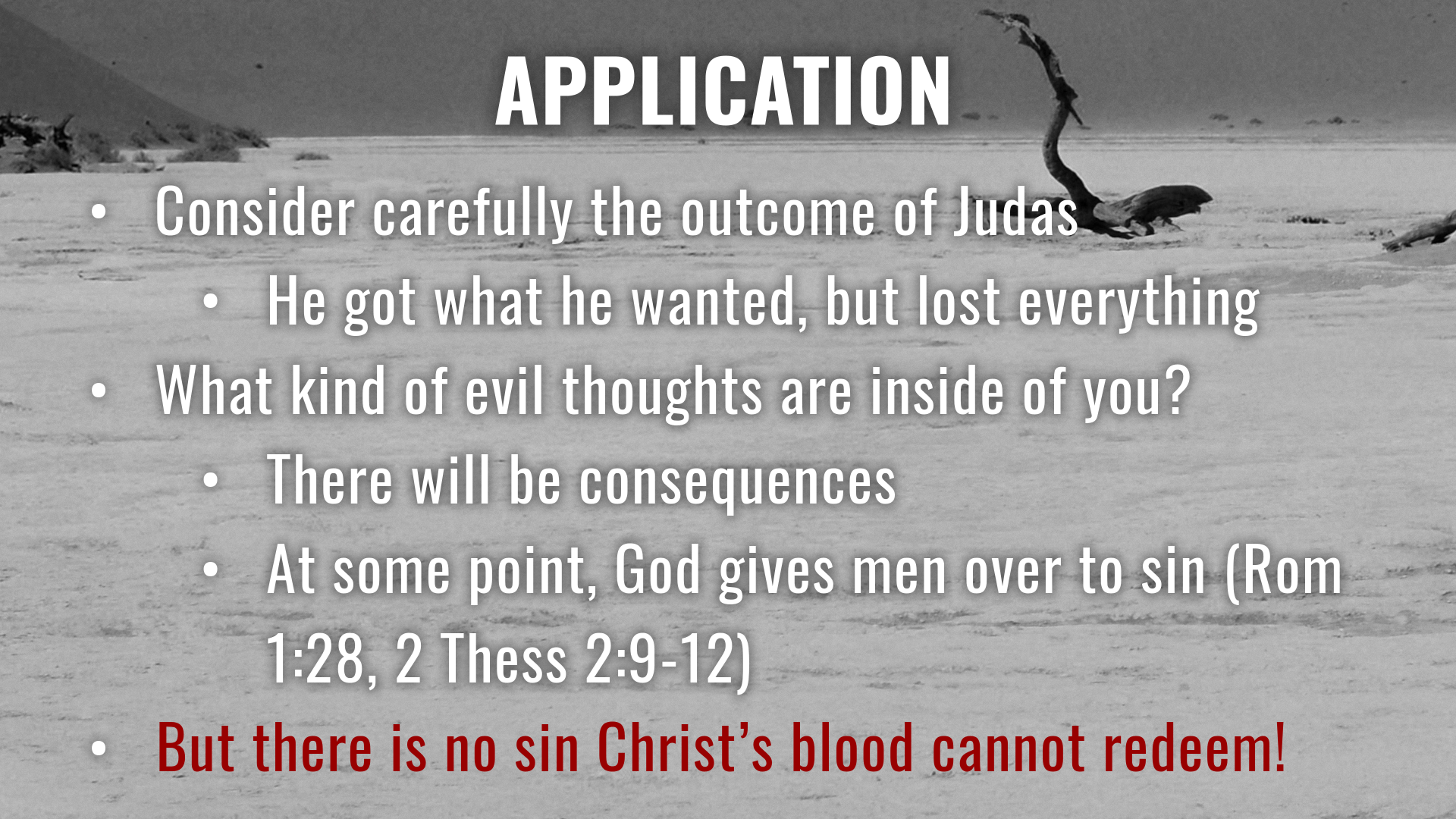Seeking & Not Finding (Matthew 27:1-10)
It's the morning of Passover, and now all the religious leaders are gathered together for an early morning trial. The night before, Jesus was arrested and brought before a smaller council so that they could nail down their accusations. During this meeting, the sentence is made official, and the decision is made to take Jesus to Pilate to handle the execution.
The Betrayer's Regret
Matthew 27:1--2 (ESV) --- 1 When morning came, all the chief priests and the elders of the people took counsel against Jesus to put him to death. 2 And they bound him and led him away and delivered him over to Pilate the governor.
Typically, this gathering of men would wait the whole day to see if anyone had any objections or evidence to free the accused. But today is Passover, and they didn't have time for that. They shouldn't even be meeting on a sacred day like this. This shows the extreme injustice of the trial.
The following words are shocking.
Matthew 27:3--5 (ESV) --- 3 Then when Judas, his betrayer, saw that Jesus was condemned, he changed his mind and brought back the thirty pieces of silver to the chief priests and the elders, 4 saying, “I have sinned by betraying innocent blood.” They said, “What is that to us? See to it yourself.” 5 And throwing down the pieces of silver into the temple, he departed, and he went and hanged himself.
Here we read a sad turn in the story. The man who had betrayed Jesus sees that Jesus is condemned and regrets his part in this. His conscience aches. He gets the money he was given and tries to bring it back to the religious leaders. He tries to undo what he has already done, but it is too little, too late. The religious leaders have everything in place, and they can't turn back now.
Notice four things that Judas does. First, Judas seems to repent from his sin. He makes a 180 degree turn around from pursuing money. Now, he wants to give the money back and undo what he has done. The only problem is that the religious leaders have already condemned Jesus, and they are happy with that outcome.
Second, he confesses his sin before the religious leaders. He tells them that he has sinned by betraying innocent blood. Confessing this should make him worthy of death, but he doesn't seem to care. The religious leaders don't want anything to do with that trial. Accepting this confession requires them to admit to their sin, but they refuse to do that.
Third, we see that Judas throws the money into the temple. He goes into the temple court, walks up to the entrance of the Holy Place, and throws the bag of money in there. Now it's their problem. I don't think Judas did this as an offering. I think he did it out of spite. He had come to them looking for help and redemption, but he didn't find it.
The final thing that Judas does is take his own life. He murders himself. Jesus said it would be better for him if he were never born. He feels that way. He feels cursed. So he hangs himself on a tree because the Old Testament tells us that those cursed are to be hanged on a tree.
Evil Men Fulfill Scripture
Matthew 27:6--10 (ESV) --- 6 But the chief priests, taking the pieces of silver, said, “It is not lawful to put them into the treasury, since it is blood money.” 7 So they took counsel and bought with them the potter’s field as a burial place for strangers. 8 Therefore that field has been called the Field of Blood to this day. 9 Then was fulfilled what had been spoken by the prophet Jeremiah, saying, “And they took the thirty pieces of silver, the price of him on whom a price had been set by some of the sons of Israel, 10 and they gave them for the potter’s field, as the Lord directed me.”
This section details how the chief priests and elders deal with the money. They don't feel it would be suitable for them to put it into the treasury. So they buy a potter's field. This would be a field that is full of clay. All the topsoil was removed, and a potter gathered clay from that field to build pottery. But now, it would be a field used to bury strangers.
But verse 8 tells us that it became known as "The Field of Blood." Then, Matthew tells us some additional information. He says it has been called The Field of Blood to this day, meaning that everyone knew this field was purchased by the blood money given to Judas. Judas' defiant act of making them handle the money had, to some extent, exposed their evil. After that, Matthew tells us that these men unknowingly fulfilled scripture.
The prophet Jeremiah bought a field in his hometown, and he met the elders at a potter's field to cast judgment against them, but he didn't say the words Matthew quotes. These words are almost a direct quotation from Zechariah 11. This is a text where God tells his prophet to shepherd a flock being destroyed by their shepherds. This is symbolic of God trying to help his people. He removes some evil shepherds, but the rest of the shepherds hate him for it. So he stops helping them and lets them be destroyed. They pay him 30 shekels of silver for his work as a shepherd. God tells him to throw the money to the potter. So Zechariah throws the money in the temple.
All of that sounds familiar, but it doesn't line up perfectly with either prophet. Still, Matthew lets us know that this is what God had in mind with the Jeremiah and Zechariah prophesies. He gave them typological significance to represent the events of these evil men.
What Do We Learn?
First, we learn that Jesus should have been set free. Judas was the one who brought Jesus in, and now he confesses that he made a mistake. The court should come back into session, and Judas should be killed, not Jesus. Jesus is called innocent by the one who betrayed him. But by the end, we find out that God's will is being accomplished through these evil men. This is all happening to fulfill scripture. Matthew keeps reminding us of this to know Satan is not winning here.
The second thing we learn is that Judas regrets what he did. His conscience crushed him. He thought that by betraying Jesus, he would move on with his life. He wasted three years following a poor carpenter's son who threw away money like it was nothing. Now he thought he could start over. Except he can't. He didn't just leave Jesus. He gave him over into the hands of evil men. He can't live with himself after acting so vengefully toward an innocent man.
Out of that revelation, we learn two critical lessons. First, we learn that internal sin fogs our judgment and leads to regret. Judas was greedy. He wanted that flask of fragrant oil for himself. He wanted Jesus to succeed because he wanted the riches and wealth that would come from winning. Peter was also selfish and distraught when he found out that Jesus would fail in the way he expected, but his heart was torn between loving Jesus and loving his ideal kingdom. When the curtain is pulled back on Judas, it is revealed that he only loved himself and money. There was no real love or devotion to Christ. So when Jesus took the prospect of gainings money away, his saw red, and his heart overflowed with vengeance and hatred. The outcome is regret greater than any joy money could ever solve.
Application
Consider the outcome of Judas carefully. He got money, but it was empty and tasteless. The fun went away quickly. There was no peace, security, or love in the world because sin separated. He lost God. What good was the world?
What kind of evil thoughts are inside of you? Are you greedy like Judas? Do you lust after someone or something that's not yours? Regret is coming. You better wake up.
We need to understand that there will be consequences, which will be more than we can bear. Regret and repentance like Judas' will not atone for my sins. I will be as lost as I feel. When we crave something ungodly, this text serves as a warning for us. That desire will cloud our judgment. It won't work out.
2 Peter 2:4--10 (ESV) --- 4 For if God did not spare angels when they sinned, but cast them into hell and committed them to chains of gloomy darkness to be kept until the judgment; 5 if he did not spare the ancient world, but preserved Noah, a herald of righteousness, with seven others, when he brought a flood upon the world of the ungodly; 6 if by turning the cities of Sodom and Gomorrah to ashes he condemned them to extinction, making them an example of what is going to happen to the ungodly; 7 and if he rescued righteous Lot, greatly distressed by the sensual conduct of the wicked 8 (for as that righteous man lived among them day after day, he was tormenting his righteous soul over their lawless deeds that he saw and heard); 9 then the Lord knows how to rescue the godly from trials, and to keep the unrighteous under punishment until the day of judgment, 10 and especially those who indulge in the lust of defiling passion and despise authority. Bold and willful, they do not tremble as they blaspheme the glorious ones,
The scriptures teach us that God gives men over to sin once they give in to it. He lets them revel in it, and he holds them for judgment. Once we go down that path to some extent, there is no turning back. Satan's deceptions become too intertwined with our identity. That's what happens to Judas and many others throughout scripture. They go from loving God to loving the world, and God lets them believe the lie. Be scared of that.
If you are listening to these words, it's not too late for you. The Lord knows how to rescue you if you turn to Him and believe in his son. God is abundantly gracious. There is NO SIN that the blood of Christ cannot cover. Remember that Jesus prayed to forgive those who hung him on the cross. His forgiveness is not like our forgiveness. But we must submit our lives to him.
Conclusion
We all have regret that eats us up inside, but we don't have to. God doesn't hold that against us anymore. The blood of Jesus takes those sins as far as the east is from the west. But guard your heart. Don't let anything other than Christ take the throne. Love him and serve him. If we resist the devil and pursue godly thoughts in everything we do, there will be no more regrets. Instead, there will be pure joy in knowing that our Father is with us and Jesus is glorified through us.





